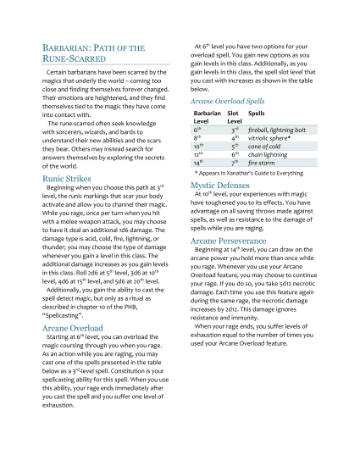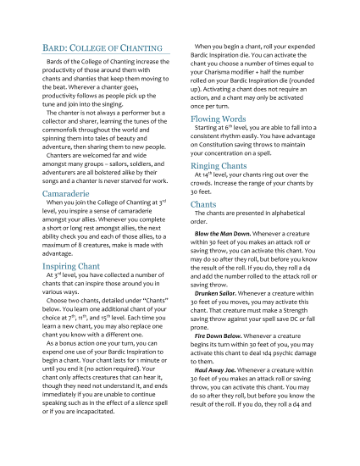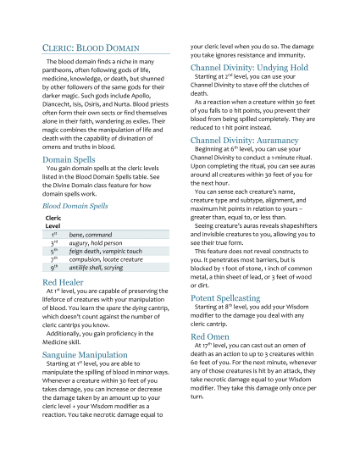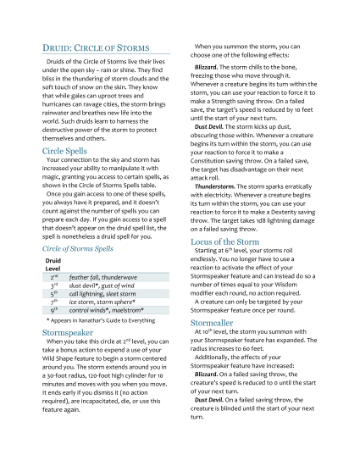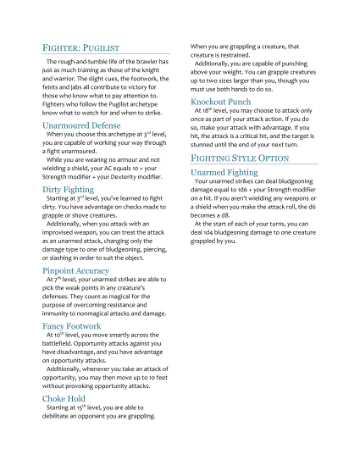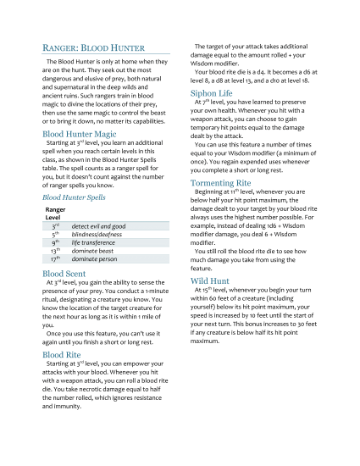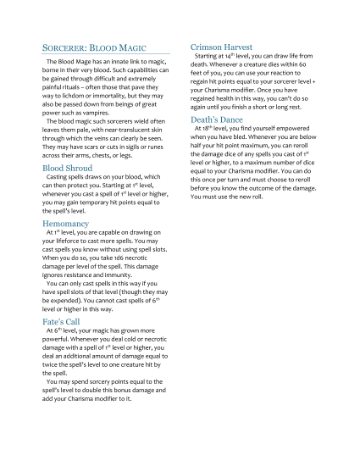Homebrew and System Adjustments
Like any game master, I have made plenty of changes to game systems and developed a bunch of my own content. Browse at your own risk however - I am a forever GM, so any play facing material might be entirely untested! Everything found in this section is designed for 5th edition Dungeons & Dragons.
Subclasses
Spells
Heroic Leap
1st-level conjuration
Bard, Sorcerer, Warlock, Wizard
Casting Time: 1 reaction, which you take when an ally within range is attacked
Range: 30 feet
Components: V, S
Duration: Instantaneous
You magically leap into the path of danger to protect an ally. Choose a space within range that is occupied by a Small or Medium creature. If that creature is willing, you both teleport, swapping places. You become the target of the attack that triggered this reaction.
Locate Self
Divination Cantrip
Druid, Wizard
Casting Time: 1 action
Range: Self
Components: V, S
Duration: Instantaneous
This spell allows you locate yourself in time and space. When you cast it, you learn your exact location in space such that you recognize it on any map and in relation to other landmarks you know.
You also learn your location in time, knowing the exact time of day as well as the hours left to sunrise or sunset, whichever comes first.
Review
1st-level divination (ritual)
Bard, Cleric, Wizard
Casting Time: 1 action
Range: Touch
Components: V, S, M (a drop of red ink)
Duration: Instantaneous
You touch a willing creature or object, learning about its whereabouts and actions within the last 24 hours. You can see and hear anything that occurred that directly affected or was affected by the creature or object.
At Higher Levels: When you cast this spell using a spell slot of 2nd level or higher, you can see a further 24 hours into the creature or object’s past for each slot level above 1st.
System Adjustments
Critical Hits
When rolling damage for a critical hit, roll double the dice as usual. You may choose to reroll one of the dice and if you do, you must take the new roll.
Drunkenness
Getting drunk can be easily handwaved, but if a player wishes to partake in a drinking contest or is seeking to otherwise avoid intoxication while still drinking, these rules apply.
For a simple calculation, a character can have a number of drinks equal to their Consitution modifier + 1 before they get drunk. In more competitive circumstances, for each drink the character imbues, they must make a Constitution saving throw with a DC equal to 6 + 2 times the number of drinks they have had.
Being drunk has the following effects:
- You have disadvantage on Dexterity checks.
- You gain advantage on Charisma (Performance) checks.
- You gain 5 temporary hit points.
- You cannot cast spells of 6th level or higher.
Instant Kills
Adventurers are incredibly heroic, and dealing an instant kill requires some serious effort. It requires twice their maximum hit points dealt in a single blow to instantly kill an adventurer (or any creature for that matter).
Intelligence Proficiencies
Highly intelligent characters are better at more things! Characters with a positive intelligence modifier can take an additional skill, weapon, tool, or language proficiency during character creation. These proficiencies do not have to be off their class list. If a character increases their intelligence with an Ability Score Increase such that their modifier increases, they may take an additional proficiency.
Potion Drinking
Drinking a potion is a bonus action. However, administering a potion to another creature still requires a full action.
Spell Scrolls
Any character can cast a spell from a scroll - the arcane power needed to invoke the spell has already been scribed into the scroll. In order to cast a spell from a scroll, the user must make an Intelligence (Arcana) check DC 10 + the spell's level. Whether they succeed or fail, the scroll is consumed.
If the character can, they may wish to use their own magic to ensure the casting succeeds - they may use a spell slot to cast a spell from a spell scroll. If the spell slot is at the same level as the spell or higher, the cast automatically succeeds. If the spell slot is a lower level than the spell, the Intelligence (Arcana) check DC is reduced by a number equal to the level of the spell slot used. For example, casting a 4th-level spell scroll with a second level spell slot reduces the Intelligence (Arcana) check from DC 14 to DC 12.
Travel and Rests
Travel is tiring work and sleeping on the road does not confer the benefits of a long rest under normal circumstances. Adventurers only gain the benefits of long rests at waypoints - towns, cities, cleared dungeons, shrines, or other established places. Though an adventurer must still take 8 hours of rest in the wilderness (or at sea), they only gain the benefits of a short rest.
In order to gain the benefits of a long rest on the road, a traveler must set up camp for one full day, remaining close to camp for the duration and thus making a temporary waypoint. Ships have the same restrictions, requiring anchoring down for 24 hours to gain the benefits of a long rest.
